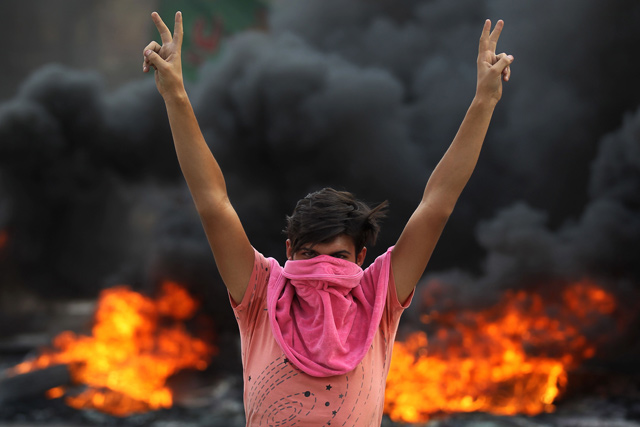BAGHDAD — Popular protests multiplied across the Iraqi capital on Wednesday, as demonstrators braved live fire and tear gas from security forces in rallies that have left three dead over the past day.
The demonstrations are the first major challenge to Prime Minister Adel Abdel Mahdi, who formed his government a year ago this month and who controversially blamed the violence on "aggressors" among the protesters.
Starting early Wednesday, crowds gathered in a half-dozen neighbourhoods across Baghdad, with riot police attempting to disperse them using tear gas and firing live rounds into the air.
Later they regrouped and began heading towards the capital's iconic Tahrir Square for the second day, railing against state corruption, failing public services and unemployment.
Riot police have sealed off several main roads, as well as access to the square and the adjacent Jumhuriya bridge.
Security forces feared protesters would cross the Tigris river into the Green Zone, which hosts government buildings and embassies and was walled-off until just a few months ago.
"I came out today in support of my brothers in Tahrir Square," said Abdallah Walid, 27, in the southern neighbourhood of Zaafaraniya.
Protesters were burning tyres on streets lined with riot police vehicles.
"We want jobs and better public services. We've been demanding them for years and the government has never responded," he said.
Calls for restraint
Journalists covering protests in central Baghdad said security forces had assaulted them and detained one of their colleagues.
"No state would attack its own people like this. We're being peaceful, but they fired," said unemployed graduate Mohammad Jubury in the nearby Al Shaab district.
Medical sources said about a dozen people were admitted to hospitals across Baghdad on Wednesday, most of them suffering from tear gas inhalation.
One protester died of wounds sustained in the aftermath of Tuesday's violence, medics and security sources told AFP on Wednesday, bringing the total toll to three dead.
A demonstrator had died on Tuesday in Baghdad, where 200 people were also wounded, and another had died in the south, health officials said.
Riot police had used water cannons, rubber bullets and live rounds to break up the protest of around 1,000 people in Tahrir Square on Tuesday.
Heavy gunfire was heard into the night around the square and in the capital's Sadr City district where the funeral was held for the protester killed in Baghdad.
It was not clear if bullets were fired directly at protesters or into the air.
The day's bloodshed drew condemnation from President Barham Saleh, who urged "restraint and the respect for the law".
"Peaceful protest is a constitutional right granted to citizens," he said late Tuesday.
The UN's top official in Iraq, Jeanine Hennis-Plasschaert, expressed "grave concern" on Wednesday, saying she "deeply regrets the casualties".
She urged authorities to "exercise restraint in their handling of the protests".
'Aggressors'
Unusually for Iraq, no political faction had explicitly called for Tuesday's protest, which appeared to be largely spontaneous.
The liberal newspaper Al Bayina Al Jadida said the protests were, "for the first time without flag, without poster or party slogan".
They follow months of simmering frustration with Abdel Mahdi over a perceived lack of progress on corruption, unemployment or services.
Routine power cuts leave consumers without mains electricity for up to 20 hours a day and, according to the World Bank, youth unemployment runs at around 25 per cent, or double the adult rate.
Protests over the same issues engulfed the southern city of Basra last summer and effectively ended Abdel Mahdi's predecessor Haider Al Abadi's chances of a second term.
Abdel Mahdi now faces a similar challenge.
He convened his national security council for an emergency meeting on Wednesday, after paying tribute to the security forces and blaming the violence on "aggressors who... deliberately created casualties".
Interior ministry spokesman Saad Maan told state media on Tuesday that "infiltrators were behind the violent acts in the protests today".
Their statements drew widespread online criticism, as some other politicians had thrown their weight behind the protesters.
Nationalist cleric Moqtada Al Sadr called for a "fair investigation" into the events in Tahrir Square.
Parliament, too, has ordered a probe into the violence and its human rights committee criticised security forces for their "suppression" of the demonstrations.
